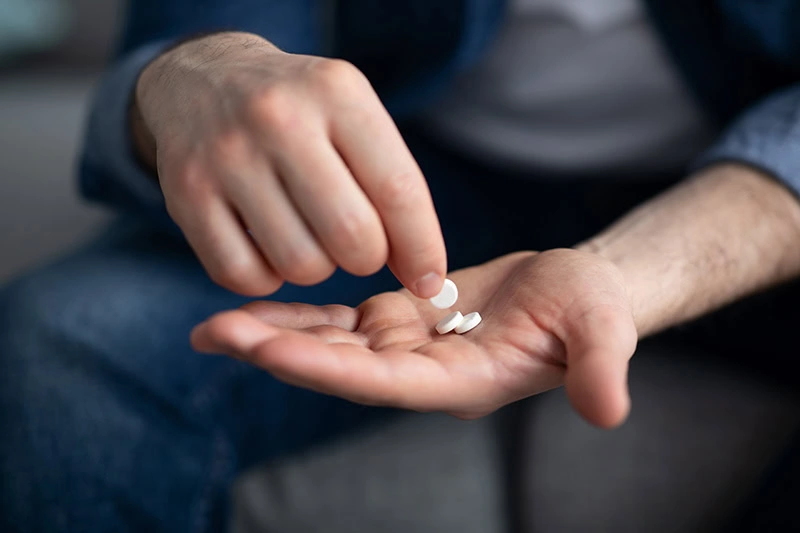Today, medication-assisted treatment (MAT) uses FDA-approved medications to help ease withdrawal symptoms for those in detox and to reduce cravings for those who are in recovery. There are many different medications that can be prescribed. So, is Suboxone used for alcohol addiction?
What is Suboxone?
Suboxone is comprised of two key medications:
- Buprenorphine
- Naloxone
Suboxone is prescribed as a substitute for opioids and one that prevents cravings. In order to understand how it works, you need to better understand the different categories of medications used for alcohol addiction.

What Medications Are Used for Alcohol Addiction?
While Suboxone is not used for alcohol addiction, there are many other approved medications that are highly effective at:
- Reducing withdrawal symptom severity
- Controlling cravings
- Reducing the risk of relapse
There are four main types of medications used in treatment:
Alcohol Antagonists
Alcohol antagonists make you sick if you drink, so you are less likely to relapse in recovery because drinking not only lacks positive effects but comes with negative ones like headaches, chest pain, vomiting, and nausea.
Examples: Disulfiram is an antagonist that you take daily in a tablet to avoid relapse.
GABA Analogs
GABA analogs block the brain signals associated with withdrawal symptoms. This makes it easier to recover from your withdrawal symptoms in a more comfortable setting and is typically only used during detox.
Examples: Acamprosate is often given within five days of your detox to block the negative withdrawal symptoms.
Opioid Agonists
Opioid agonists are medications that connect to the same brain receptors as an opioid. However, they don’t give you the same high. They are typically used to help reduce opioid-related cravings. However, these medications can be used to minimize withdrawal symptoms associated with alcohol use disorder, particularly:
- Seizures
- Delirium tremens
They can also be used after withdrawal to help prevent relapse by reducing the intoxicating high that alcohol gives you when it’s combined with other drugs like opioids.
Examples: Methadone is the most common, used in an oral concentrate. Buprenorphine is a partial opioid agonist too that can be used in film form, injection, tablet, and subdermal implant.
*Note: Opioid agonists like methadone are typically prescribed for those who have an addiction to both opioids and alcohol and are only used with a medication-assisted treatment program.
Opioid Antagonists
Opioid antagonists don’t bind to the opioid receptors in your brain; instead, they block them. This means you don’t get the feeling of a high if you use opioids, which helps decrease cravings.
For alcohol addiction, some opioid antagonists can bind to the endorphin receptors in your body and similarly block the effects of alcohol consumption.
This means that taking it during recovery reduces how much you crave alcohol and the amount that you consume. It can also be used to help you maintain your sobriety once you stop drinking entirely.
Examples: Naltrexone is an opioid antagonist that is commonly used for alcohol use disorder.
How Suboxone Works
Suboxone tightly binds to the same opioid receptors in the brain as oxycodone, heroin, morphine, and the like. It stops the intoxication, however, so even if you were to use those substances again, you wouldn’t feel the same high. Moreover, it stops the cravings that are so common with opioid recovery, which reduces the risk of relapse.
Using Suboxone is part of your opioid recovery program and makes it easier to transition back to regular life.
Is Suboxone Used for Alcohol Addiction?
No, technically, Suboxone is not used for alcohol addiction. It is only used for opioid addiction.
However, if you have an alcohol addiction and an opioid addiction, you can take Suboxone as part of your treatment plan.
Like methadone, if you take Suboxone for opioids, you might find that using fewer opioids directly results in drinking less, too, and that the effects of mixing alcohol and opioids don’t happen, so you are less likely to relapse.
Getting Treatment for Alcohol Use Disorder
At East Coast Recovery, our alcoholism treatment is customized to each client, including the length of care. We know that individuals who struggle with addiction do best when they receive at least 3 months of treatment in order to create a successful foundation and that treatment typically starts with medication-assisted treatment using some of the medications listed above.
Safe detox is not only important for your comfort level but for your overall success, as alcohol withdrawal can have very serious and sometimes fatal side effects. With our team, you don’t have to be intimidated by a longer treatment program or different medications and their potential side effects. We are there to work with you so that you get the best outcomes and the highest chance of long-term stability.
Reach out to our team today to learn about our top alcohol rehab program in Boston, MA.










